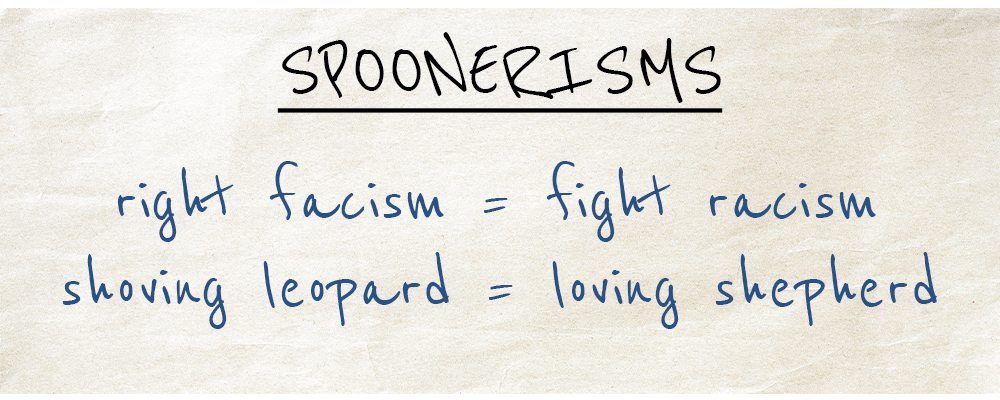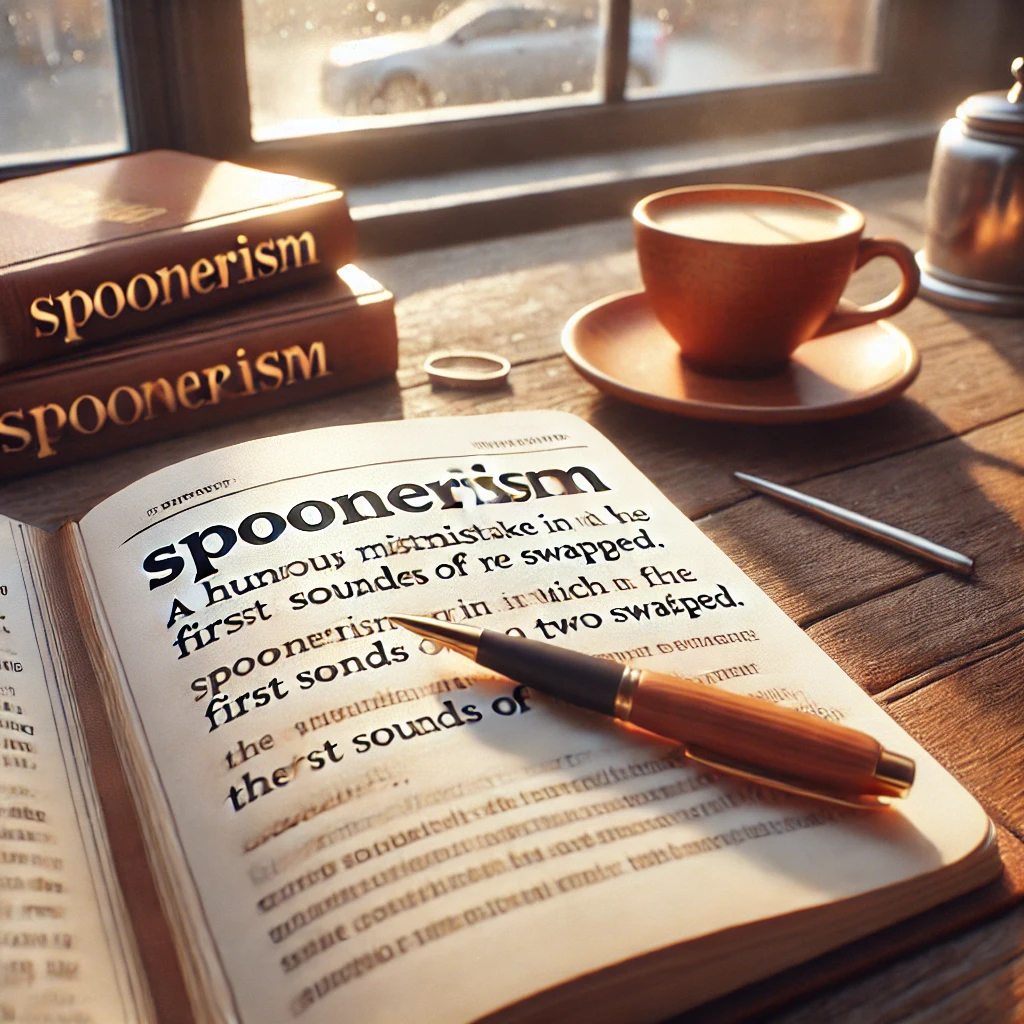Have you ever accidentally mixed up the sounds of words while speaking, only to create an unintentionally hilarious phrase? If so, you’ve experienced a spoonerism! Spoonerisms are linguistic errors where the initial sounds or letters of two or more words are swapped, often resulting in a funny or nonsensical phrase. Named after Reverend William Archibald Spooner, who was infamous for such verbal mix-ups, spoonerisms are one of the quirkiest forms of wordplay that continue to make us laugh.
Thank you for reading this post, don't forget to subscribe!In this article, we’ll explore what spoonerisms are, and their amusing history, and dive into some of the funniest examples that will get you giggling.

What Is “Spoonerism”?
A spoonerism occurs when the initial sounds or letters of two or more words are accidentally switched, creating a humorous new meaning. For example, instead of saying “crushing blow,” you might say “blushing crow,” which is quite a different image altogether! While spoonerisms often happen by accident, some are deliberately crafted for comedic effect.
Spoonerisms are named after Reverend William Archibald Spooner (1844–1930), an Oxford University professor and clergyman. Spooner was notorious for unintentionally mixing up his words in speeches, creating funny and memorable phrases that students found highly entertaining. Although Spooner’s actual slips might have been exaggerated over time, the concept stuck, and spoonerisms became a beloved form of wordplay.
Why Are Spoonerisms So Funny?
Spoonerisms are funny because they disrupt our expectations. When you’re expecting to hear a familiar phrase and the words get jumbled, your brain does a double-take, and the surprise creates humor. These accidental slips often sound absurd or create amusing mental images, making them especially entertaining. The more unexpected the result, the funnier it tends to be!
For example:
- “You have hissed all my mystery lectures” (instead of “missed all my history lectures”).
- “It is kisstomary to cuss the bride” (instead of “customary to kiss the bride”).
In both cases, the swapped sounds create an entirely different meaning that’s both surprising and funny.
10 Hilarious Spoonerism Examples
1. “The weight of rages will press hard upon the employer.”
(The rate of wages will press hard upon the employer.)
In this spoonerism, mixing up “rate” and “weight” flips a common economic concern into an amusing image of anger and resentment weighing down an employer!
2. “A well-boiled icicle.”
(A well-oiled bicycle.)
Imagine a frozen icicle being boiled—it doesn’t make sense, but that’s what makes it funny. This classic spoonerism takes the familiar and turns it into a humorous, if nonsensical, picture.
3. “Is it kisstomary to cuss the bride?”
(Is it customary to kiss the bride?)
This wedding spoonerism creates a hilarious scene—hopefully, no one accidentally cusses the bride on her big day!
4. “You’ve tasted the whole worm.”
(You’ve wasted the whole term.)
This mix-up conjures up an image of someone accidentally tasting a worm instead of doing something as mundane as wasting a school term. It’s an unexpected twist that’s sure to get a laugh.
5. “Better Nate than lever.”
(Better late than never.)
An iconic spoonerism that might leave you picturing a character named Nate being preferable to any kind of lever. The phrase gets its humor from being totally bizarre while still maintaining the recognizable rhythm of the original phrase.
6. “A lack of pies.”
(A pack of lies.)
While you might have expected to hear about dishonesty, this spoonerism turns it into a humorous commentary on the absence of baked goods. Who wouldn’t be disappointed by a lack of pies?
7. “You have hissed all my mystery lectures.”
(You have missed all my history lectures.)
Imagine a classroom full of students hissing through an entire mystery lecture. This academic-themed spoonerism is a delightful twist on what should have been a perfectly serious statement.
8. “Let me sew you to your sheet.”
(Let me show you to your seat.)
The last thing anyone wants in a theater is to be stitched to their chair! This spoonerism turns a helpful usher’s phrase into a ridiculous image.
9. “A blushing crow.”
(A crushing blow.)
Instead of picturing a powerful hit, this spoonerism gives us the image of a crow turning red with embarrassment, which is a funny and unexpected mental picture.
10. “Tease my ears.”
(Ease my tears.)
Here, comforting someone goes hilariously wrong, as “teasing” their ears wouldn’t exactly help ease their sadness. It’s a playful mix-up that lightens a typically emotional phrase.

The History Behind Spoonerisms: Meet Reverend Spooner
While spoonerisms existed long before they were named, they became widely known thanks to Reverend William Archibald Spooner. A professor at Oxford University, Spooner was known for his absent-mindedness and frequent verbal mishaps. Whether or not he actually made all the spoonerisms attributed to him is up for debate, but his reputation for mixing up his words certainly stuck.
Some classic spoonerisms attributed to Spooner include:
- “The Lord is a shoving leopard.” (The Lord is a loving shepherd.)
- “Three cheers for our queer old dean!” (Three cheers for our dear old queen!)
These accidental slips became the stuff of legend, and over time, “spoonerism” became the official term for any humorous sound swap.
Spoonerisms in Pop Culture
Spoonerisms have found their way into pop culture, often used for comedic effect in movies, TV shows, and literature. Writers and comedians sometimes intentionally create spoonerisms to entertain their audiences, knowing that the wordplay will surprise and amuse them.
For example, in The Simpsons, the character Principal Skinner is known for his spoonerisms, including the phrase, “You’ve been sass-mouthing me all day, and now it’s payback time. Let’s see how you like it when the shoe is on the other foot, and the foot is on the other shoe!” While not a traditional spoonerism, it plays with the same concept of reversing words to create humor.
In Alice’s Adventures in Wonderland by Lewis Carroll, there’s also a famous spoonerism-like moment where words are jumbled and swapped to create nonsensical, humorous dialogue, showcasing Carroll’s love of linguistic play.
Why Do Spoonerisms Happen?
Most spoonerisms happen accidentally due to cognitive slips. Our brains are wired to process language in specific ways, and when we’re speaking quickly or distracted, we can end up swapping sounds or letters. This is known as a speech error, and while it’s usually harmless, it often results in hilarity.
Spoonerisms are a type of metathesis, where sounds or letters within a word or phrase switch places. These slips happen because our brains sometimes retrieve or organize words incorrectly during speech production. Fortunately, the results are usually funny rather than confusing!
How to Create Your Own Spoonerisms
While spoonerisms often happen by accident, you can also create them intentionally for fun or to entertain your friends. Here’s how to craft your own spoonerisms:
- Start with a Simple Phrase: Pick a short, familiar phrase that people will recognize easily, like “crushing blow” or “loving shepherd.”
- Swap the Initial Sounds: Switch the first sounds or letters of two key words in the phrase. For example, “crushing blow” becomes “blushing crow.”
- See if It’s Funny: The best spoonerisms create a funny or unexpected new meaning. If your phrase sounds too awkward or nonsensical, try different word combinations until you find something that works.
- Test It Out: Share your spoonerism with friends or family to see if it gets a laugh. If it’s funny and easy to understand, you’ve created a winner!
Conclusion
Spoonerisms are one of the funniest quirks of language, turning everyday phrases into surprising, often ridiculous expressions. Whether they happen by accident or are carefully crafted for laughs, these sound swaps always manage to entertain. So, the next time you accidentally tell someone they’ve “hissed all your mystery lectures,” just laugh it off—you’ve just created your own spoonerism!
Are spoonerisms always accidental?
Not necessarily! While many spoonerisms are accidental, some people create them deliberately for humorous or poetic effect.
What’s the difference between a spoonerism and a malapropism?
A spoonerism involves swapping sounds or letters between words, while a malapropism happens when someone accidentally uses a word that sounds similar to the intended word but has a completely different meaning.
Why do spoonerisms make us laugh?
Spoonerisms catch us by surprise and disrupt our expectations. The unexpected sound swaps create humor because they result in nonsensical or absurd phrases.
Can spoonerisms happen in other languages?
Yes! Spoonerisms occur in many languages, not just English. The concept of swapping sounds or letters between words is universal, though the results will vary based on the structure of the language.
What are some other famous spoonerisms?
“Fighting a liar” (Lighting a fire).
“Our queer old dean” (Our dear old queen).
“Cattle ships and bruisers” (Battle ships and cruisers).
Can spoonerisms be used in writing?
Absolutely! Writers, comedians, and poets often use spoonerisms intentionally to create humor or play with language. However, because spoonerisms are typically a spoken phenomenon, their impact is usually stronger in speech.







